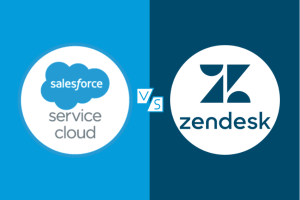Supply chain management relates to the movement of goods from the supplier and down to the last consumer and might be a discrete process involving planning, raw material acquisition, making of the goods, and distribution. However, management of these processes involves a lot of labor. Several problems in the movement concerning delay, high costs, and uncertainty about what the customer wants weigh against the companies.
This is where AI comes in. The advanced technology that AI employs makes it possible to provide the business with wiser decisions. If applied to supply chain management, companies will improve their operation in two very important ways: efficiency and transparency.
- Efficiency is when more is produced with less time and in fewer errors.
- Transparency refers to clear information regarding every detail of the supply chain.
The blog stresses the characteristics where AI makes supply chain management more of an easier task in dealing with operations problems, thereby enhancing better visibility all along the process.
What is Supply Chain Management?
Supply Chain Management is the process of extracting a firm’s products from where they start to the customers. It was likened to connected steps, meaning that everything moves with smoothened processes in any given way.
SCM encompasses planning what is produced, sourcing materials from the best suppliers, manufacturing the products, delivering to stores or to customers, and handling returns. Supply chain management is pretty important because it makes the process more efficient, costs less, and enhances customer satisfaction through the availability of the products at the right time when they are needed.
In addition, it would provide transparency to track SCM at any point of time and by all stakeholders involved. This further helps in solving the various problems in time. From this perspective, understanding and applications of SCM best practices have now become the basics for those companies looking to be competitive as well as grow in the fast-paced markets of today.
Role of AI in Supply Chain Management

AI is changing the supply chains the companies manage: From computer systems’ use in tasks that classically require human intelligence to understand data and make decisions. Here’s how AI plays a critical role in supply chain management:
1. Enhancement of Demand Forecasting Potential
AI helps companies predict what their customers will buy sometime in the near future. That is, where there is incorporated analyzed history of sales data and trends, it becomes easy for AI. For that reason, companies would stock only the right quantities of their wares, avoid loss through wastage, and eventually ensure that customers get just what they need.
2. Inventory Management Optimisation
Managing stock is quite cumbersome. By using artificial intelligence, it would be able to keep track of the inventories that can display when a business needs certain items to refill and update. This evicts errors and saves time and ensures shelves are full without preordering.
3. Reduction in Logistical and Transportation Complexity
AI eases logics with its generation of the fastest routes in terms of delivery. For instance, an AI algorithm can be pre-programmed to follow the trend of the traffic and that of the weather conditions in determining the quickest routes for the trucks. With this, deliveries become more timed and also reduce the cost of fuel.
4. Supplier Relationship Management
AI also helps a firm in choosing and managing suppliers. It can analyze the performance of a supplier based on the delivery timings as well as the quality of the product. Thus, companies would build better relations with reliable suppliers, and risk in the supply chain would decline.
5. Real-time Monitoring
With AI, corporations will be able to monitor their supply chain in real time. This means being able to determine problems of delay or shortage at the point they are occurring. Quick responses to problems ensure that operations continue smoothly and the customer is pleased.
How AI Improves The Supply Chain’s Efficiency
Artificial intelligence changes the way companies treat a supply chain with the help of automation, and of course, speed efficiency. Here are a few ways in which AI increases efficiency:
1. Automates Repetitive Tasks
AI can automate repetitive tasks, which otherwise would have been carried out manually. The system might possibly update stock levels automatically, or even process orders. Apart from saving time, this will also minimize errors that creep in during such mundane work. Once the mundane details are sorted out by AI, employees are freer to focus on weightier matters requiring critical thinking.
2. Predictive Analytics
AI gives very bright predictions about what will happen in the future using humongous amounts of data. For instance, the AI can use previous sales history to predict near-future demand. This has made businesses better prepared so that they will never find themselves wanting too little or too much of any product when their customers want to buy it.
And since it’s better to predict, there might also be the avoidance of excess or lack of inventory and all the money saved from that.
3. Monitor Remotely
AI would then enable a company to see the whole supply chain in real-time. It therefore tracks everything: from moving shipments to the exact times when changes in levels of demand occur right away. When shipping gets delayed or when an unexpected spike in demand happens, AI can shoot a prompt alert at the team. Such reactions enable them to avoid later, bigger problems and level out operations.
AI will seek out opportunities to make other processes within the supply chain more efficient, such as monitoring each process in the supply chain. For instance, AI will recommend routes between truck delivery sites; it will reduce travel time and fuel usage. It is from all the background learning and adaptation that business becomes even more efficient over time with AI.
How AI Supports Transparency in Supply Chain?
One of the reasons for supply chain transparency is that every participant realizes and also understands what happens at every stage. That is why it improves building up trust among partners, hence businesses make better choices. There are several ways AI does that and makes the supply chains much more transparent.
1. Increased data sharing
With the AI-based supply chain, information flows very smoothly across every part; therefore, suppliers, manufacturers, and retailers can share pretty vital data very comfortably. For example, if a supplier has knowledge that shipment is delayed, they will let the manufacturer know instantly and hence such one can shift plans. Therefore, open communication helps people on the same page and to act according to change.
2. Traceability
Traceability enables the trace of a commodity from the origin point to the final point of sale for the last consumer. It becomes easier with AI since it goes to resort to the use of sensors as well as analytics. For example, if a consumer would like to know where his food came from, then AI can explain how it traveled from the farm to the store. This curies not just customers but also safety and quality.
This can be really helpful when a product needs to be recalled because it is dangerous and companies know they can track every single place that has had the product and to whom they distributed it.
3. Risk Management
It may try to identify potential issues even before they start. Scanning through huge data streams from different sources, AI will be able to monitor trends and signals that seem risk-related. For instance, if the region of the supplier is experiencing unfavourable weather conditions, AI may alert businesses so they will have a better position in having other choices by being prepared. This minimizes surprises and enables companies to cope up with problems.
Problems and Challenges
While AI increases the management of supply chains, it also brings along several business issues. That being said, here are some of the most significant ones:
1. Data Security and Confidentiality
AI usage involves collecting and processing a large amount of data. Here lies a challenge for the issues of dealing with data. The firms need to take measures of protecting data from cyber attacks from their customers and suppliers as well. Ways of strengthening data security become important for protecting sensitive information.
2. Interoperability with other systems
Many firms already have various sorts of software and devices used in their supply chain. Installation of such AI solutions along with the systems that already are there will develop inconveniences. An AI solution is one whose incorporation would be complicated rather than not disturbing the running systems of the relevant business. The incompatibility may upgrade the older systems or ensure compatibility between multiple software.
3. Labour Adjustments
AI is going to change the way that the people will work in the chains of supplies. Workers need education on the application of such new tools. Among the fears that the people have is job loss at the firms because AI replaces them. Companies ought to, first train their workers and also enlighten them on how AI can help them in their positions instead of taking their place.
Future for AI in Supply Chain Management
The near future for AI in supply chain management is bright and promising, and critical trends and possibilities we expect among these include the following.
1. Emerging Trends
Innovations and advances in AI technology are rapid and more sophisticated in its application in SCM. Among the emerging trends are:
Predictive analytics: Ai is going to progressively become smarter and better at producing predictive data on what that future demand is going to be. This means that the business will understand better what customers want and reduces wastage meaning they stock enough in hand.
This makes automation the order of the day. This will see to it that the inventory management and order processing are fully automated. This, in turn, will speed up the supply chains and cut times so that workers can work on more strategic value-added tasks.
Smart Warehousing: With the technological tools available today, with AI, a warehouse could be developed to be “smart” in an operational manner by the robots taking care of the products or being all-out automated systems that sort, store, and retrieve goods and highly come about to fast delivery.
2. Integration with IoT.
This will connect devices and systems together so that they can exchange information with each other. In a supply chain, IoT might be able to show real-time how much inventory is remaining, where the shipments are, and how well equipment performance is going on. With AI, businesses will be able to gain insights helpful to them in making quicker decisions. For example, if the delivery truck encounters the traffic condition, AI re-routes it so that it will arrive before the agreed time.
3. Role of Blockchain
Another technology that can be adopted as a complement to AI is blockchain. It allows the safe record of all transactions of the same product along the supply chain. Data analyzed by AI can, therefore, track products from the manufacturer to the end-user. This extra layer of transparency will create a better situation to instill trust and accountability along the supply chain knowing that products are safe and authentic.
4. Improvement in Customer Experience
It will also facilitate better servicing by the firms to customers. Based on customer data analysis, the companies can easily develop tailored offers and suitably respond to the needs of the customers. This means faster delivery, effective communication, and products aligned to what customers really want.
Conclusion
The introduction of AI in supply chain allows for a more developed form of opportunity for those businesses willing to change their existing operations. As the AI technologies grow, companies are able to become efficient while optimizing their inventory and, therefore, better respond to the market needs.
Beyond that, AI has fostered transparency: firms have been able to present information about their involvement in a given supply chain, and eventually, this increased trust among parties in that chain. Companies would be put in a better place to compete in the increasingly competitive modern supply chain environment by embracing AI.
That is more of a strategic move towards being a supply chain that is more efficient, more transparent, and even more resilient. In such a case, where business eyes such a step, the journey into integration with AI opens not just as an opportunity for better operations but also for innovation and growth in any dynamic marketplace.


